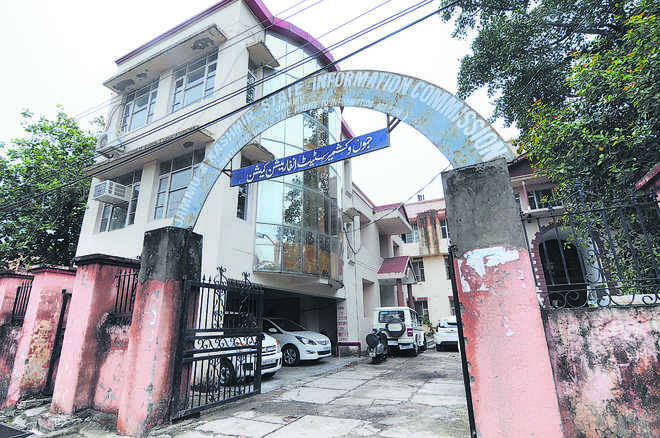
The building of J&K State Information Commission in Jammu. Tribune photo: Inderjeet Singh
Lt-Gen Pramod Grover (retd)
India, the largest democracy in the world, became the 56th country to introduce the Right to Information Act (RTI Act) on October 12, 2005. This act is one of the most advanced right to information legislations in the world. It is a reflection of a liberal and resurgent India that understands the power of knowledge in the hands of the common man and takes democracy to the grassroot level. It has been seen as the key to strengthening participatory democracy and ushering in people-centred governance. Thus, the RTI serves as the oxygen for democracy and development.
However, repeated attempts have been made to amend this Act to, perhaps, diminish its power and disarm citizens. For example, concerted efforts were made to remove 'file notings' from the purview of the RTI Act in 2006 and again in 2009 to stop 'vexatious' and 'frivolous' RTI queries. However, on both occasions, the proposed amendments were withdrawn in view of the widespread resistance.
Through the RTI (Amendment) Bill 2018, circulated among MPs, there is a proposal to do away with the parity given to the information commissions with the election commissions.
According to the proposed amendment, the salaries, allowances and other terms and conditions of service of the CIC and ICs 'shall be such as may be prescribed by the Central government'. The tenure of information commissioners at the centre and the states is proposed to be amended from 'a term of five years' to 'terms as may be prescribed by the central government'.
In the statement of objects and reasons of the Bill, it has been brought out that 'functions carried out by the EC and ICs are completely different. Hence, their status and service conditions need to be rationalised accordingly. The EC is a constitutional body established by Clause (1) of Article 324 of the Constitution, while the CIC and state information commissions are statutory bodies established under the provisions of the RTI Act, 2005'. Pertinently, no prior public consultations have been held.
Equally relevant is that the information commission functions as an adjudicator as well as regulator. If the commissions are to fulfill the objectives of the Act to empower the common man, the rule of law must prevail. The public must perceive the information commissioner as a public-friendly judge with high integrity, utmost degree of credibility, public trust, professional excellence and capacity, leadership qualities and dynamism. In its role of regulator, every commission is required to monitor the implementation of the Act by the government and its agencies. The commissions are to report to the legislature on how the Act has been implemented. In this regard, every commission has to keep its ears close to the ground, and remain receptive to the view of the public, the media and non-government organisations, all of whom have an important stake in information freedom. Thus, an environment has to be created for the IC to function without any interference or pressure.
In this context, the proposed amendments to the RTI Act will compromise the independence and autonomy of information commissions set up to adjudicate on appeals and complaints of people who have been denied their rights. The argument that the CIC cannot have the stature of the EC, which is a constitutional body, is flawed as it is the requirement of the job done at these commissions.
The spirit of the RTI Act mandates the replacement of a prevailing culture of secrecy with one of transparency. This is a right fought and owned by the citizens that flowed from the Constitution as a Fundamental Right to speech and expression under Article 19 (1) (a), and any amendments without public consultation must be reconsidered.
Further, the Supreme Court has in various judgments stated that the right to vote and right to information are fundamental rights. Hence, the CIC and CEC stand on equal footing and have rightly been placed on a par by the RTI Act 2005 after debate and consultations. Accordingly, terms and conditions of CICs were finalised as per Sec 13 (5) and that of state information commissioners as per Sec 16 (5) of the RTI Act.
The RTI Act 2005 recognises the authority of states to select their SICs, but the proposed Amendment Bill does not allow states to decide their term, status and salary as it proposes the Centre will prescribe it from time to time. Such a measure will compromise the autonomy in functioning.
In a democratic society, people are the most powerful element and the right to information empowers them to realise the fruits of democracy. Efforts, therefore, have to be made to have an open regime accountable to its people. To achieve that objective, openness/sunlight is the best disinfectant. Dilution in any form will be detrimental to openness as openness is concomitant of free society.



























